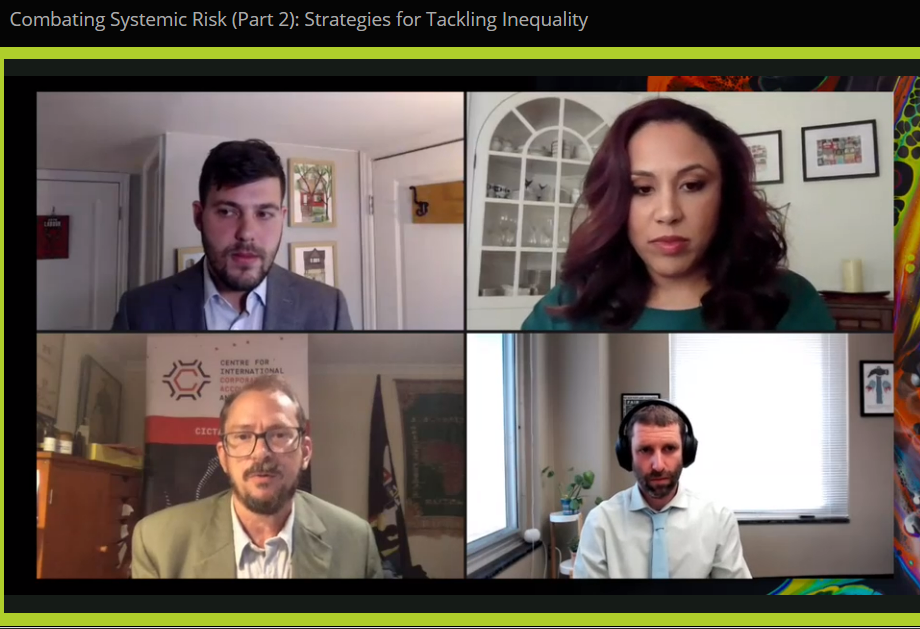0
Speakers
united from across the country and around the globe.
0
Sponsors
dedicated to building a sustainable, inclusive and productive economy.
0
Virtual Attendees
collaborating towards meaningful change across capital markets.
Reunite, Reignite.
The 2022 SHARE Investor Summit, Reunite Reignite, brought together investment decision-makers, community mobilizers, and asset owners to shift capital markets towards inclusion, justice, equity, sustainability and resilience. From March 1 to 4, we gathered virtually for four days of expert-led conversations, digital deep dives, and educational workshops.
Below, find a breakdown of highlights from each day of the Summit, including calls to action for mobilizing change.
Day 1
In our opening plenary, Reconciliation and Corporate Canada, we heard from Tabatha Bull, CEO of the Canadian Council for Aboriginal Business (CCAB), and John McKenzie, CEO of TMX Group, on their collaboration for Canada’s first National Day for Truth and Reconciliation in October 2021. The discussion revolved around the role of executive leadership in facilitating organizational change, the value of programs like the Progressive Aboriginal Relations (PAR) certification program for improving corporate performances, and the potential of dual-class share structures to help Indigenous businesses grow capital while also preserving Indigenous control.
To learn more about reconciliation and business, explore the Reconciliation and Responsible Investment Initiative for related resources and content.
Call to Action: In meeting places where Indigenous peoples have historically been left out, it is leadership’s role to reconcile this inequity
After the plenary, participants broke out into groups for our educational workshops, including the Pension Trustee Bootcamp, the Pension Trustee Masterclass, and Net Zero for Foundations and Endowments. Each workshop provided tailored and targeted presentations and discussions to meet investment decision-makers at a level suited to their experience and goals.
If you are interested in providing targeted educational training for your team or network, please visit our Advisory Services page for more information.
Watch the recording of Reconciliation and Corporate Canada.
“Problems demand solutions. They demand to be solved, and they demand action. That is what we are doing here at the Summit.”
- Kevin Thomas, CEO, SHARE

Day 2
Day 2 opened with a Keynote address from US Securities Commissioner, Allison Herren Lee, Who led us in a conversation on the critical role regulators play in ensuring that the regulatory environment enables shareholders to exercise their rights and hold management accountable. In her discussion with SHARE CEO, Kevin Thomas, she spoke to climate change being a critical systemic risk in today’s society, but not the only one. Others include human capital, inequality, and diversity and inclusion. Developing specific related disclosure requirements can help investors make informed decisions and mobilize accordingly—if standardized.
Call to Action: There are significant opportunities in Canada to improve securities and other relevant regulations in areas such as reconciliation, diversity, pay equity, decent work and human capital disclosure, human rights due diligence disclosure and addressing double materiality.
Watch the recording of Combating Systemic Risk Part 1.
After the Keynote, the Summit featured a deep dive into supply chains and human rights, in our campaign spotlight on decent work and the textile industry. To learn more about this movement, visit the International Accord for Health and Safety, the Clean Clothes Campaign, #PayYourWorkers Campaign, and SHARE’s ongoing work on human rights issues in global supply chains.
The day closed with part one of our conversation on Combatting Systemic Risk, which included a fireside chat with long-time institutional investor Jon Lukomnik of Sinclair Capital LLC. Jon discussed how asset owners need to be concerned with the health of the overall economy and the systems on which markets rely, because without that, there is no return. His insights shed light on the shortcomings of Modern Portfolio Theory (MPT), and how it does not provide the answers or the tools for addressing these kinds of systemic risks. You can learn more in his book, Moving Beyond Modern Portfolio Theory.
“It doesn’t make sense that as investors we are not paying attention to workers as a source of value.”
- Cambria Allen-Ratzlaff
Corporate Governance Director, UAW Retiree Medical Benefits Trust

Day 3
Our third day began with a plenary on Shareholder Engagements for Climate Change, and elaborated on the role of collaborative investor-driven programs like Climate Action 100+ and Climate Engagement Canada, and how they demonstrate to companies that climate change is an urgent issue they must address.
Call to Action: It is insufficient for companies to simply release a statement committing to net-zero emissions. Companies must also provide investors with short-term and medium-term emissions reductions targets along with a comprehensive decarbonization strategy to demonstrate that they actively taking steps to address climate change.
The day continued with a deep dive into campaigns centred on racial equity audits and how they can meaningfully improve company investments in diversity, equity, and inclusion. For more information, explore Committee for Better Banks research, Racial Equity Audit Toolkit, and Racial Equity in the Board Room from Majority Action.
The final plenary for the day was Part 2 of our conversation on Combatting Systemic Risk, focusing on combatting systemic inequality. The panel featured Anthony Schein, Cambria Allen-Ratzlaff, Matthew Stark Blumin, and Jason Ward, who explained that in order to see meaningful actions towards reducing inequality, more work needs to be done to expose the effects of financialization on wealth inequality.
Call to action: Encourage companies to join the Fair Food Program and support binding and enforceable agreements like the Fair Food Program and the International Accord to uphold workers’ rights in supply chains.
Day 4
The final day of the Summit ended with exclusive network caucuses for religious investors, trustees and trade union representatives, universities, foundations and family offices, and reconciliation mobilizers, to network, collaborate, and share ideas related to next steps.
Watch the recording of Reconciliation Action Plans 101.
Save the date for the 2023 Summit!
We will be gathering from Feb. 14-16 in Vancouver, B.C.


